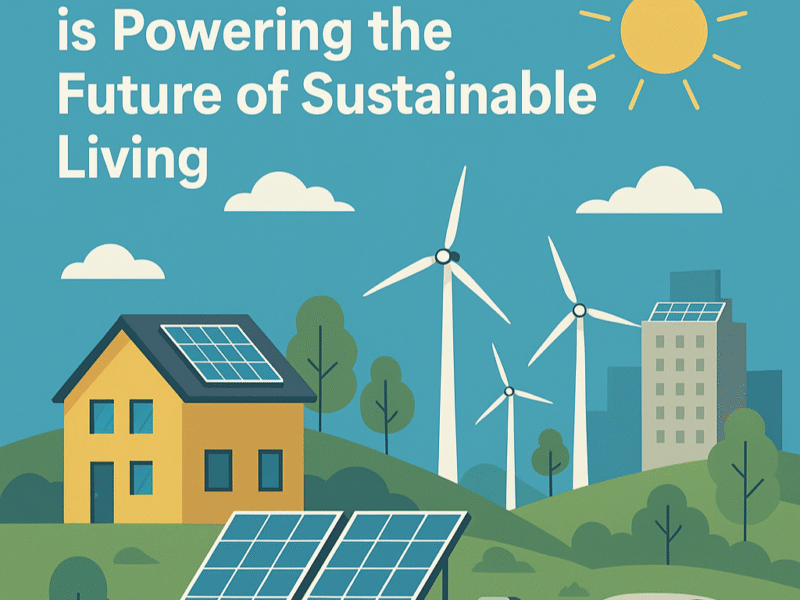
Introduction
In today’s world, where climate change, rising electricity costs, and environmental pollution are pressing issues, solar energy stands out as a powerful and sustainable solution. It is not just an alternative energy source — it’s a major step toward a green, eco-friendly lifestyle that can transform the way we live and interact with the planet.
With the growing global demand for clean energy, solar power is paving the way for sustainable development by helping individuals, businesses, and governments meet their energy needs in a responsible and cost-effective manner.
What is Solar Energy?
Solar energy is the energy harnessed from the sun’s rays using solar panels and converted into electricity or heat. This form of energy is renewable, meaning it will never run out as long as the sun shines. Unlike fossil fuels, it doesn’t emit harmful greenhouse gases, making it one of the cleanest energy sources available today.
Why is Solar Energy Important for Sustainable Living?
1. Clean and Pollution-Free Power
Solar energy production involves no harmful emissions, air pollution, or toxic waste. Unlike coal or diesel-based power plants, solar systems produce 100% clean energy, which helps reduce our carbon footprint and fight climate change. It contributes to a healthier planet and a better quality of life.
2. Energy Independence
With off-grid solar systems, people can produce their own electricity without relying on traditional power grids. This is especially useful in rural or remote areas where grid electricity is unreliable or unavailable. It empowers individuals and communities to become energy self-sufficient.
3. Long-Term Financial Savings
After the initial installation cost, solar power systems generate electricity for free. Most systems pay for themselves within 5–7 years through reduced electricity bills. Over 25 years, homeowners and businesses can save lakhs of rupees/dollars in electricity costs.
4. Promotes Green Innovation
Solar technology is evolving rapidly. With innovations like solar roofs, smart inverters, solar batteries, and portable solar devices, solar energy is becoming more efficient and accessible. These advancements support eco-conscious living and inspire green technology development.
5. Low Maintenance and Long Lifespan
Solar panels require minimal maintenance and typically last 25–30 years or more. With proper care, they continue to generate clean energy reliably for decades, making them a cost-effective and long-term investment.
The Rise of Solar Energy in India
India is one of the fastest-growing markets for solar energy. The government is actively promoting solar power through various subsidy schemes and initiatives, including:
PM-KUSUM Yojana – Promoting solar pumps for farmers
Rooftop Solar Subsidy Scheme – Helping homeowners reduce the cost of installation
Solar Park Scheme – Developing large-scale solar infrastructure
States like Rajasthan, Gujarat, Maharashtra, and Tamil Nadu are leading the way in solar adoption. The country aims to achieve net-zero emissions by 2070, and solar energy is at the core of that vision.
Urban vs Rural Applications
In urban areas, rooftop solar panels are being installed in homes, offices, hospitals, and schools. They reduce power bills and serve as a reliable backup during outages.
In rural India, solar energy is transforming lives by powering water pumps, street lights, schools, and micro-enterprises, especially where grid electricity is limited. Solar solutions are helping bridge the energy gap and support the vision of a Digital India and self-reliant villages.
Why Solar is the Future
As fossil fuel reserves deplete and electricity demand grows, solar energy offers a secure and sustainable path forward. It not only helps reduce dependence on non-renewable sources but also protects the environment for future generations.
Countries worldwide are making massive investments in solar to reduce their carbon emissions and meet climate goals. Whether you’re an individual homeowner, a business owner, or a policymaker — adopting solar is one of the most impactful steps you can take today.
Final Thoughts
Solar energy is not just a trend — it’s the future. It empowers us to live more sustainably, reduce environmental damage, and create a greener tomorrow. By embracing solar energy today, we contribute to a cleaner, healthier, and more energy-efficient world.
So, whether you’re looking to reduce your electricity bills, minimize your carbon footprint, or become energy-independent — solar is the smart and responsible choice.
FAQ:
Q1: What is solar energy and how does it work?
A: Solar energy is the power generated from the sun’s rays. It is captured using solar panels, which convert sunlight into electricity using photovoltaic (PV) cells.
Q2: Is solar energy really a reliable source of power?
A: Yes, solar energy is reliable. Modern solar systems can store energy in batteries for use at night or during cloudy weather, ensuring uninterrupted power supply.
Q3: How can solar energy help save electricity costs?
A: Once installed, solar systems generate electricity for free. This significantly reduces your monthly electricity bills, often recovering the installation cost within 5–7 years.
Q4: What are the environmental benefits of using solar energy?
A: Solar energy is clean and renewable. It reduces carbon emissions, air pollution, and dependency on fossil fuels, making it an eco-friendly power solution.
Q5: Can I install solar panels on my home rooftop?
A: Yes, rooftop solar panels are a great option for homes. Many governments also provide subsidies and incentives to make installation affordable.
Q6: How long do solar panels last?
A: Solar panels typically last 25–30 years or more. They require minimal maintenance and continue to produce power efficiently for decades.
Q7: Does solar energy work during rainy or cloudy days?
A: Yes, solar panels can still generate some electricity during cloudy weather, though at reduced efficiency. Solar battery storage systems can provide backup power during such periods.

